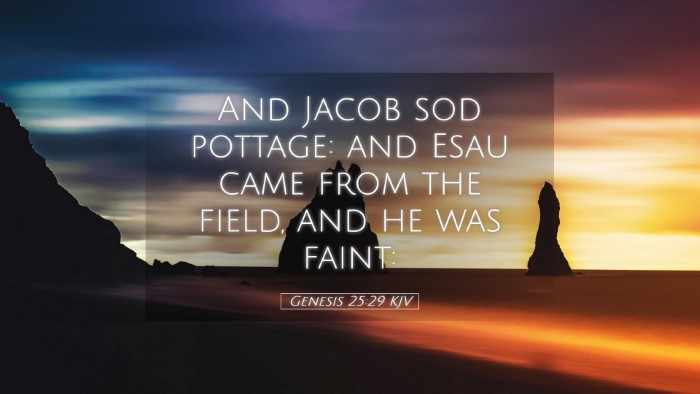Commentary on Genesis 25:29
Genesis 25:29 reads: "Once when Jacob was cooking some stew, Esau came in from the open country, famished." This verse serves as a pivotal moment in the narrative of Jacob and Esau, highlighting themes of desire, recklessness, and the importance of spiritual precedence over temporal needs.
Contextual Background
To understand this verse adequately, we must place it within the context of the early chapters of Genesis, where the dynamics between Jacob and Esau, twin brothers born to Isaac and Rebekah, are established. Their contrasting characteristics—Jacob's contemplative nature and Esau's impulsiveness—set the stage for the events that will unfold.
Matthew Henry's Commentary
Matthew Henry emphasizes the significance of Esau's physical hunger as a metaphor for spiritual hunger. He notes that Esau's impulsive nature leads him to prioritize his immediate gratification over his birthright, which holds covenantal blessings. Henry asserts that this encounter is illustrative of how earthly passions can overshadow divine obligations. He writes:
"Esau’s selling of his birthright shows the folly of disvaluing spiritual treasures for carnal satisfaction."
Impulsiveness of Esau
Henry highlights Esau's characteristics, describing him as a "carnal man" whose immediate earthly needs dictate his decisions. This impulsivity serves as a cautionary tale, warning against the danger of allowing temporal desires to disrupt one's spiritual inheritance. This mirrors modern concerns where individuals often prioritize immediate pleasures over long-term spiritual growth.
Albert Barnes' Commentary
Albert Barnes offers insights into the cultural and historical context of the birthright. He explains that the birthright in ancient Israel was of paramount importance, entailing not only a double portion of inheritance but also spiritual leadership within the family. Barnes elaborates on the foolishness of Esau in the face of such a precious legacy:
"Esau's eager desire for a meal leads him to act against the interests of his own future."
The Symbolic Meaning of Stew
Barnes interprets the "stew" as a symbol of earthly comforts and indulgences that can distract one from spiritual responsibilities. He draws parallels to contemporary life, arguing that many are willing to exchange spiritual promises for fleeting pleasures. The stew represents the allure of worldly satisfaction, appealing to those who, like Esau, may place current needs above eternal truths.
Adam Clarke's Commentary
Adam Clarke provides a detailed exploration of the implications of this passage relative to the personalities of Jacob and Esau. Clarke highlights Jacob's proactive approach, noting that while his actions may appear deceitful, they reveal his understanding of the greater significance of their covenantal birthright. He states:
"Jacob's method of gaining the birthright indicates a depth of spiritual insight; he realizes the value of what Esau takes lightly."
Spiritual Implications
Clarke discusses the spiritual implications present in this exchange, asserting that the verse highlights the tension between divine providence and human agency. Jacob, by preparing the stew, becomes a pivotal actor in God's plan, fulfilling the prophecy given to Rebekah regarding the older serving the younger (Genesis 25:23). This duality of fate and free will invites deeper reflection on how divine purposes can intersect with human decisions.
Theological Reflections
From the combined insights of these commentators, several theological themes emerge from Genesis 25:29. Each theme resonates with pastoral and scholarly audiences, encouraging self-reflection and deeper understanding of God’s work in human affairs.
1. The Temptation of Immediate Gratification
Esau’s choice embodies the danger of succumbing to immediate desires at the expense of long-term spiritual rewards. In today's world, where instant gratification is a prevalent issue, this passage serves as a reminder to prioritize eternal values.
2. The Significance of Birthright and Covenant
Understanding the birthright as a symbol of spiritual authority and covenantal promise prompts leaders in faith to reflect on their responsibilities to uphold and teach God's truths, preserving the sacredness of spiritual inheritance.
3. Human Choices Within Divine Sovereignty
The balance of human action and divine purpose runs throughout the narrative. Jacob's actions, while morally ambiguous, contribute to the unfolding of God’s plan. This invites theological exploration concerning how humanity collaborates with divine sovereignty.
4. The Promise of God's Faithfulness
The narrative assures believers that despite human failings and choices, God remains faithful to His promises. Esau traded his birthright, but God’s plan will ultimately prevail, demonstrating God’s sovereignty in the fulfillment of His covenant.
Conclusion
Genesis 25:29 is more than a historical account; it serves as a profound lesson for believers regarding the significance of spiritual priorities, the effects of impulsive decisions, and the interplay between human responsibility and divine providence. These timeless insights from the commentaries of Matthew Henry, Albert Barnes, and Adam Clarke continue to resonate as they guide pastors, students, and scholars in their understanding of the Scriptures.


